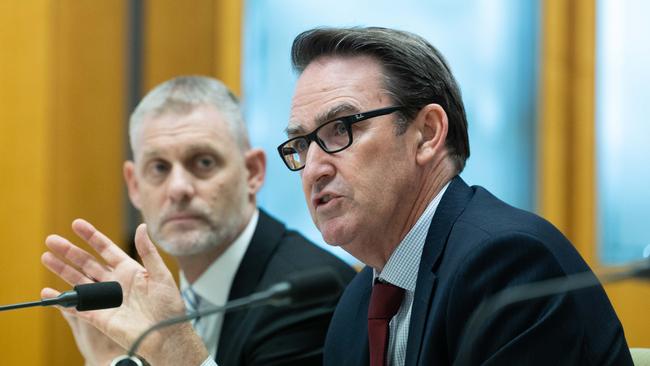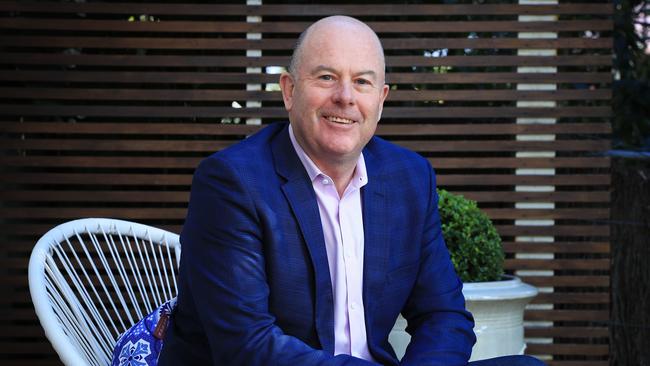AFP, finance, warn PwC tax leaks consequences will go further
The AFP and the Department of Finance have warned of broader consequences of investigations into PwC’s leak of confidential tax information.
The attempt by embattled big four professional services firm PricewaterhouseCoopers to quarantine the leak of confidential tax information looks set to be smashed after the Australian Federal Police and the Department of Finance warned of broader consequences for the 53-plus partners and staff involved in the breach.
Appearing in parliament on Thursday, the AFP revealed it would expand its investigation into the leaking of confidential tax information beyond disgraced former PwC head of international tax Peter-John Collins.
Mr Collins and PwC were formally referred to the AFP on Wednesday by Treasury, amid a probe into the firm’s leaking of confidential tax briefings by Mr Collins which enabled the firm to construct strategies for its clients to minimise their tax obligation.
In a statement on Wednesday, Treasury secretary Steven Kennedy said Mr Collins “improperly used confidential Commonwealth information”, with emails tabled before parliament showing “the significant extent of the unauthorised disclosure of confidential Commonwealth information and the wide range of individuals within PwC who were directly and indirectly privy to the confidential information”.

AFP national security deputy commissioner Ian McCartney said the investigation was being run through the sensitive investigations team, but was a priority.
“It relates to an individual in relation to their activities, but the investigation is at its early juncture,” he said.
“We’ll work through that process and if we identify any further people we believe may have committed an offence that will be included in the investigation.”
Parliament has heard 53 current and former PwC partners and staff received emails revealing confidential tax information.
Former PwC chief executive Tom Seymour has admitted to the firm’s partners that he was a recipient of the emails which highlighted marketing of the tax advice and has resigned from the job but remains a partner at the firm and will stay on until September to assist in the leadership transition.
Two other partners on PwC’s 16-strong executive board, Pete Calleja and Sean Gregory, have also quit leadership positions.
Kristen Stubbins has been appointed PwC’s interim CEO, pending an election by partners.
The Department of Finance has also demanded PwC stand down staff, working on government projects, if they participated in the firm’s leaking of confidential tax information.
This would see PwC staff involved in the leak working on government projects stood down from their roles until a review into the firm’s leak of the tax information, as well as a broader cultural review of the partnership, being prepared by corporate veteran Ziggy Switkowski, is finalised.
PwC is understood to be complying with Finance’s request and moving to stand down staff.
Mr Switkowski was appointed by PwC last week to run a review of the firm, but the consulting and audit giant has only confirmed it would release a summary of the findings.

Appearing in Senate Estimates on Thursday, Department of Finance secretary Jenny Wilkinson slammed PwC over the leak of confidential tax information as an “abuse of confidence and trust”.
But Ms Wilkinson took aim at PwC over the firms’ response to a letter from Finance in January, which saw the firm attempt to assure the department the breach was limited.
However, the department said disclosures in May showed the breach extended “significantly broader than a single individual” and raised concerns.
Ms Wilkinson said PwC would monitor the situation “including PwC’s responses to our directions”, warning the department reserves its rights to take further steps if it was dissatisfied with the findings of the review.
At risk are PwC’s contracts with the government worth more than $530m.
The rolling scandal looks likely to deepen, with many insiders now suggesting the chance of a Royal Commission into consultants such as PwC and their workings with the government has increased.
The NSW government also revealed on Thursday it was considering imposing multimillion-dollar penalties for businesses and organisations which reveal confidential government tax information.
PwC is facing growing accusations that it is not facing up to the level of mistakes it has made – including its refusal to reveal the names of the 53 partners and staff apart from Mr Collins that were involved in the tax fraud.
Rival firm KPMG has come out on the front foot, calling out the behaviour of PwC.
In an email sent to all staff, KPMG Australian chairman Alison Kitchen and CEO Andrew Yates cautioned about the “significant exposure” of the PwC leak.
“This latest news is an important development: we can no longer sit by and watch our profession be tarnished by the unethical actions of a few. The decision by Treasury underlines the gravity of the matter.”

Under the blunt headline “doing the right thing” KPMG issued a mea culpa for past wrongs such as the integrity of the work it did in 2020 by two separate teams for NSW Treasury and Transport for NSW on different aspects of the controversial Transport Asset Holding Entity.
“As a firm we have not got everything right. And with 10,000 people working on complex and high-profile projects, there may be cases where we fall short of what is expected.”
KMPG’s stance on the matter appears at loggerheads with PwC, which has battened down the hatches and not revealed a number of important facts, including the names of the 53 partners and staff that were involved in the tax fraud, which have all, bar Peter Collins, been redacted.
In its letter to staff, KPMG reiterated that it supported findings of the independent review into the effectiveness of the Tax Practitioners Board and the Tax Agent Services Act 2009, which found the board’s sanctions powers need to be increased.
“KPMG supports the recommendations … that relate to strengthening sanctions, improving individual accountability of partnerships and increasing TPB independence. Our firm looks forward to further public consultation on these reforms in the coming months,” the company said in its letter to staff.
Specifically, KPMG is calling for increasing individual accountability for the delivery of tax agent services within a company or partnership.
Increasing the TPB’s sanction powers, including introducing a number of new sanctions. Plus, introducing greater flexibility for the TPB when undertaking investigations, including when disclosing reasons behind sanctions.





